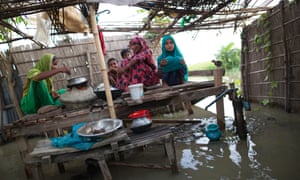
The International Monetary Fund has told rich countries they must do more to help poor nations cope with climate change or suffer from the weaker global growth and higher migration flows that will inevitably result.
In a chapter released ahead of the publication of next month’s World Economic Outlook, the Washington-based IMF said low-income countries had contributed little to the increase in greenhouse gas concentrations and could not afford to tackle the problem from their own meagre resources.
“Rising temperatures would have vastly unequal effects across the world, with the brunt of adverse consequences borne by those who can least afford it,” the IMF said.
“The international community will have a key role to play in fostering and coordinating financial and other types of support for affected low-income countries. With advanced and emerging market economies contributing the lion’s share to the warming that has occurred so far and is projected to continue, helping low-income countries cope with its consequences is a humanitarian imperative and sound global economic policy.”
Using conservative assumptions, the IMF said that by 2100 income per head in a typical low-income country would be 9% lower than it would be in the absence of temperature increases. It added that the present value of these losses would amount to the loss of an entire year of current economic output for a poor nation.
The adverse impact of climate change would be long-lasting and would be felt through lower agricultural output, reduced productivity in sectors exposed to the weather, weaker investment and poor health. Higher temperatures constrained growth in the hot regions of emerging and developing economies significantly more than in hot regions of rich nations, underlying the importance of development in reducing vulnerability, the IMF said.
The chapter noted that low-income countries had “huge spending needs and scarce resources to undertake the investments necessary to cope with climate change.” The United Nations has agreed a set of sustainable development goals to be met by 2030, but achieving them would require poor countries to increase public spending by up to 30% of gross domestic product. This would not be possible for most countries, the IMF said.
“Moreover, domestic policies alone cannot fully insulate low-income countries from the consequences of climate change as higher temperatures push the biophysical limits of these countries’ ecosystems, potentially triggering more frequent epidemics, famines, and other natural disasters, at the same time fuelling migration pressure and conflict risk,” the chapter said.
It warned that “substantial migration flows, potentially spilling across country borders, could arise if climate change leads to a significant rise in sea levels.” On current global warming projections, hundreds of millions of people in low-lying areas could become vulnerable to flooding, forcing them to abandon their homes.
The international spillovers from the most vulnerable countries, through depressed economic activity and potentially higher conflict and migration flows, could be considerable, the IMF said. “Going forward, only a global effort to contain carbon emissions to levels consistent with an acceptable increase in temperature can limit the long-term risk of climate change.”

No comments:
Post a Comment